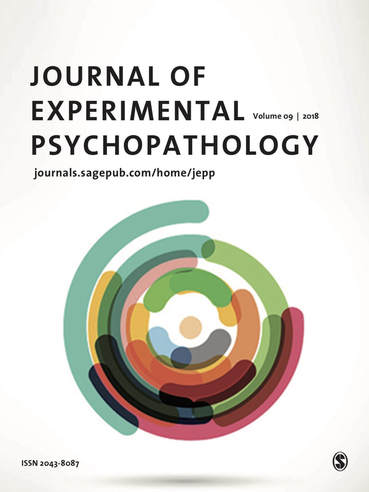The Journal of Experimental Psychopathology (EPP) is an open access, peer reviewed, journal focused on publishing cutting-edge original contributions to scientific knowledge in the general area of psychopathology. Although there will be an emphasis on publishing research which has adopted an experimental approach to describing and understanding psychopathology, the journal will also welcome submissions that make significant contributions to knowledge using other empirical methods such as correlational designs, meta-analyses, epidemiological and prospective approaches, and single-case experiments.
Theoretical and review articles addressing significant issues in the description, aetiology, and treatment of psychopathologies are also welcome. Articles contributing to knowledge of most areas of psychopathology will be considered for publication, including anxiety-based problems, depression and mood disorders, schizophrenia and psychotic symptoms, substance abuse and dependency, eating disorders, sexual and gender identity problems, personality disorders, somatoform disorders, dissociative experiences, neurological disorders, childhood psychological problems, and learning, intellectual and developmental disabilities. Participants in published studies may include individuals with diagnosed mental health problems, non-clinical human populations, human analogue populations, or nonhuman animals.
In the traditional spirit of experimental psychopathology, submissions from studies on non-clinical populations that make a contribution to understanding the aetiology of psychopathology will be especially welcomed. While the journal's focus is primarily on the psychological and cognitive processes associated with psychopathology, contributions studying the biological substrates of psychopathology will also be considered.
The Journal also welcomes systematic reviews, literature reviews, meta-analyses and theoretical articles that supplement or challenge existing theoretical views of psychopathology or clinical phenomena. Contributions will be welcomed from any areas of psychology and neuroscience where the content makes a significant contribution to understanding the aetiology or treatment of psychopathology phenomena.
Theoretical and review articles addressing significant issues in the description, aetiology, and treatment of psychopathologies are also welcome. Articles contributing to knowledge of most areas of psychopathology will be considered for publication, including anxiety-based problems, depression and mood disorders, schizophrenia and psychotic symptoms, substance abuse and dependency, eating disorders, sexual and gender identity problems, personality disorders, somatoform disorders, dissociative experiences, neurological disorders, childhood psychological problems, and learning, intellectual and developmental disabilities. Participants in published studies may include individuals with diagnosed mental health problems, non-clinical human populations, human analogue populations, or nonhuman animals.
In the traditional spirit of experimental psychopathology, submissions from studies on non-clinical populations that make a contribution to understanding the aetiology of psychopathology will be especially welcomed. While the journal's focus is primarily on the psychological and cognitive processes associated with psychopathology, contributions studying the biological substrates of psychopathology will also be considered.
The Journal also welcomes systematic reviews, literature reviews, meta-analyses and theoretical articles that supplement or challenge existing theoretical views of psychopathology or clinical phenomena. Contributions will be welcomed from any areas of psychology and neuroscience where the content makes a significant contribution to understanding the aetiology or treatment of psychopathology phenomena.
EDITOR-IN-CHIEF
Allison Waters Griffith University, Australia
ASSOCIATE EDITORS
Chris Askew University of Surrey, UK
Yannick Boddez University of Groningen, The Netherlands
Laurence Claes University of Leuven, Belgium
Jonas Everaert Ghent University, Belgium
Frances Meeten University of Sussex, UK
Amy Pinkham University of Texas at Dallas, USA
Allison Waters Griffith University, Australia
ASSOCIATE EDITORS
Chris Askew University of Surrey, UK
Yannick Boddez University of Groningen, The Netherlands
Laurence Claes University of Leuven, Belgium
Jonas Everaert Ghent University, Belgium
Frances Meeten University of Sussex, UK
Amy Pinkham University of Texas at Dallas, USA
